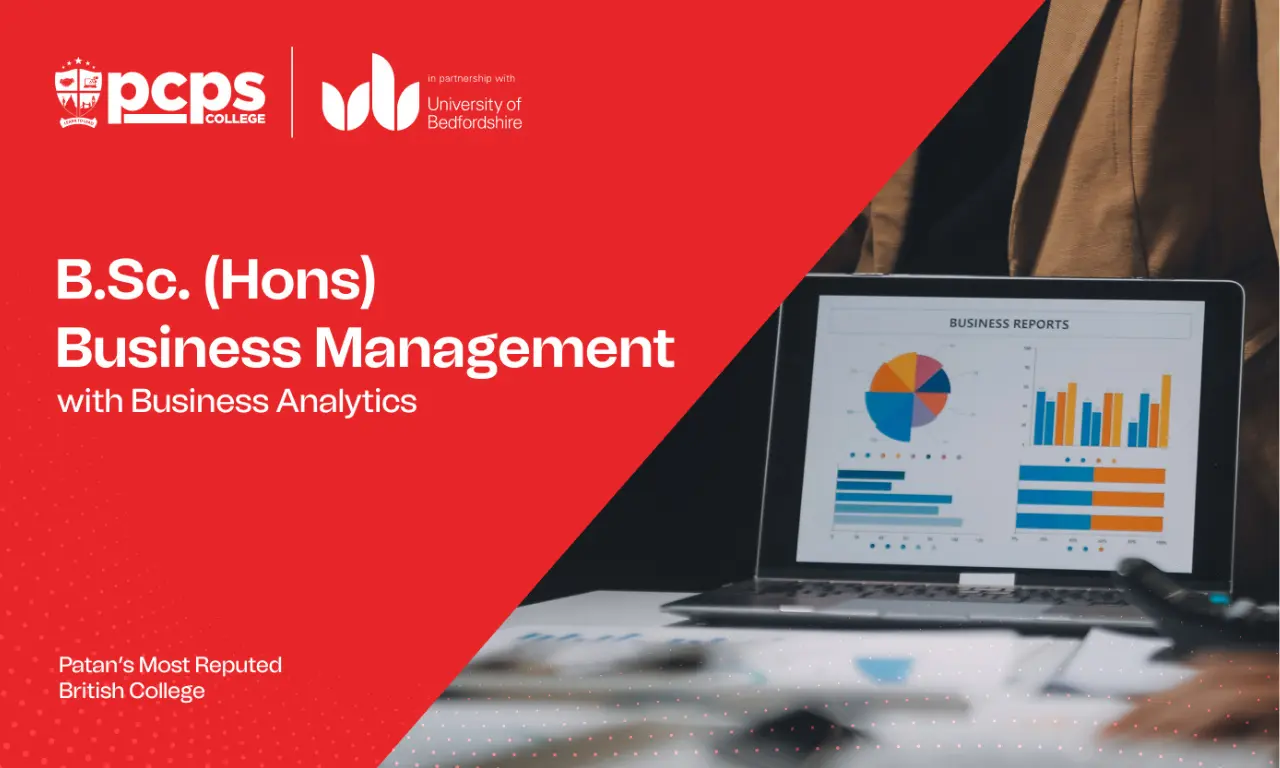About Course
One of seven Business Management pathway options, this course merges business management with digital expertise, preparing graduates for data-driven careers. You gain a thorough training in data analysis, decision-making and real-world application from day one, exploring business management areas such as marketing and management as well as programming for data analysis; soft system analysis; and data modelling. You also develop a specialism through our seven pathway options: Digital Marketing Finance Human Resource International Business Law Placement
Why B.Sc Business Management with Business Analytics ?
- Demonstrate an understanding of modern management practices in a technology dependent and data driven business environment (EDI, Sustainability, Ethics)
- Analyze business complexity through the application of theories and frameworks in the management of business functions including Marketing, Finance, Operations, HRM, Strategy Design and Decision Making, Information Systems and Technology, and Governance
- Critically investigate complex and varied situations situation collecting and evaluating information, and sourcing and analysing data in order and learn demonstrate understanding of a range of business problems and propose effective solutions and make recommendations
- Apply a range of problem solving methodologies including both qualitative and quantitative techniques using relevant decision making models and business analytics; As all as communicate evidence-based outcomes to a wider range of audience
- Display skills relevant in managing organizations effectively including stakeholder management, decision-making, leadership, communications skills, numeracy, team working
- Select, propose and implement a research project through utilization of appropriate and innovative methodology (such as gathering information, analyzing information and making informed decisions) and the ability to use these research skills to solve problems in a business context
- Develop a critical understanding of analytical technologies and advanced computational methodologies for decision making
Distinctive Features
- Broadly based yet enough depth (programming skills, testing skills etc.) so as to give you credible vocational skills in Software Engineering;
- Coverage of the entire Software Engineering life cycle and comprehensive skills in applied programming and in applied Software Engineering topics;
- Taught by staff with both a strong academic research background who’re also actively engaged in knowledge transfer (e.g. to local SME’s), and who are at the forefront of their field;
- Emphasis on the life-cycle but also in depth skills such as programming and analysis.
Career / Future Opportunities
On this course, you develop specific skills and knowledge in the area of
data analytics and business management that allow you, upon graduation, to
follow a career as a data consultant able to offer business solutions using
data-driven, evidence-based analysis. The course will help you prepare for
opportunities to become data analysis specialist in the area of marketing,
finance and operations across a wider range of service sectors.
You also develop the skills required for lifelong learning, meaning you are
well prepared to keep up with the ever-evolving field of business data
analysis and ensure your future employability.
Course Structure
| Unit Code | Level | Unit Name | Credits |
|---|---|---|---|
| MAR026-1 | 4 | Beginning your Professional Business Journey | 30 |
| BSS009-1 | 4 | Evolution and Revolution of Business | 30 |
| AAF020-1 | 4 | Applied Numeracy for Business | 30 |
| BSS010-1 | 4 | Management in Practice | 30 |
| MAR042-2 | 5 | Data and Research Methods for Business | 15 |
| AAF022-2 | 5 | Data Analysis for Finance and Economics | 15 |
| BSS035-2 | 5 | Employability and the future workplace | 15 |
| BSS037-2 | 5 | Managing Business Complexity | 30 |
| BSS034-2 | 5 | Smart Business | 15 |
| BSS036-2 | 5 | Risk and Responsibility | 30 |
| CIS051-3 | 6 | Business Analytics | 30 |
| BSS078-3 | 6 | Data Optimization | 15 |
| SHR020-3 | 6 | Dissertation | 30 |
| BSS083-3 | 6 | Business Continuity and the Planet | 30 |
| BSS077-3 | 6 | Data Visualization | 15 |
-
Year-1
-
Coursework ( Projects, Assessments )58%
-
Written Exam14%
-
Practical Exam28%
-
-
Year-2
-
Coursework ( Projects, Assessments )43%
-
Written Exam44%
-
Practical Exam13%
-
-
Year-3
-
Coursework ( Projects, Assessments )86%
-
Written Exam14%
-
Entry Requirement
The basic criteria required for entry to the courses are listed as follows: The applicants should have any of the following:
- Successfully pass Plus 2 with minimum 55% OR 2.2 GPA in Grade XII and minimum C in individual subject
- OR 2 A level passes (with minimum C and D Grades)
- OR Successfully complete Foundation year (from a recognized university or HE institution)
English language requirements are as follows :
- English language requirements are as follows :
- OR Nepalese High School 12th English minimum 60% or B Grade
- University of Bedfordshire ELAS with minimum of B+ Grade.
Intake
- May-June Intake
- Sept-Oct Intake
- Jan-Feb Intake

